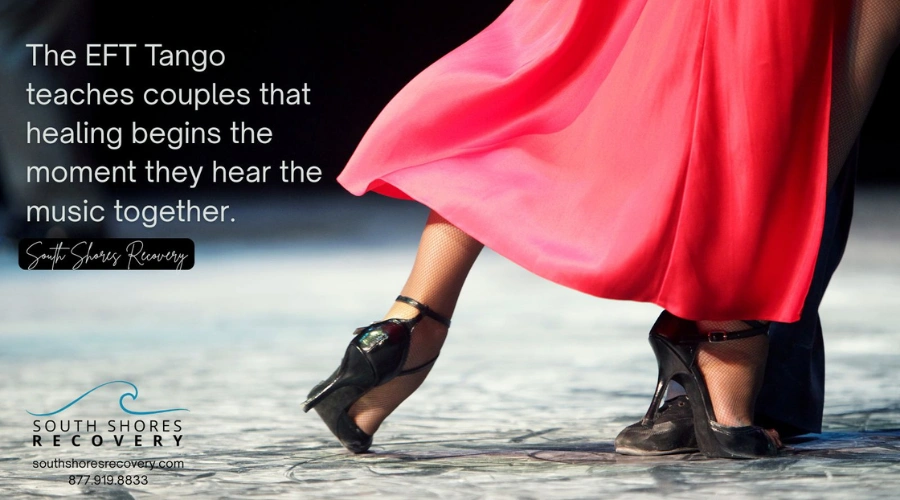Knowing the Steps And Stages of Emotional Focused Therapy
Is your relationship more rocky than you would like it to be? Are there issues you and your spouse or partner recognize but cannot overcome along? There is a proven form of relationship therapy that can assist in clearing these roadblocks, and it is called Emotionally Focused Therapy or EFT.
The three stages of EFT therapy offer couples a clear and structured roadmap as they seek to rebuild trust and strengthen bonds.
During the process, a couples therapist helps them learn to identify patterns of emotional responses, explore attachment issues, and break negative cycles.
At South Shores Recovery in Dana Point, California, we use emotionally focused therapy for our couples rehab programs. We also sometimes use EFT with clients in one-on-one therapy to work with their partner individually. The therapy provides a framework that can create true emotional engagement. It’s especially beneficial when old problematic relationship issues resurface frequently.
Working with a couples therapy specialist is a safer way to explore the underlying emotions behind your relationship distress. We invite you to keep reading to understand how EFT therapists can guide these challenging conversations, and if you and your loved one would like detox and couples rehab support options, our caring team is only a confidential call away.
What Are The Stages of EFT Therapy?

Many want to know what it will take to experience the emotional closeness they want with their partner. EFT focuses on restoring healthier interactions and intimacy in a 3-stage process.
Stage One: De-escalation and Reducing Negative Interaction Cycles
In the first stage of therapy, clients identify the negative interaction patterns that keep them stuck in one place. An EFT therapist helps each partner spot the emotions underlying their reactions. This process helps the client recognize how the emotional experiences may come from underlying attachment fears, not events of the present moment.
During the therapy process, clients gain a deeper understanding of how issues express core conflicts and how each partner’s behaviors stem from a fundamental need for connection and safety. The point of the de-escalation process is to help the partners delineate conflict issues, allowing them to have discussions without making emotional distress worse. Once couples have learned to notice emotional shifts as they happen, they become ready to find new solutions and build a more secure attachment.
Stage Two: Restructuring Emotional Bonds and Repairing Trust
Stage two couples start exploring the tender and hidden parts of themselves that can lead to emotional challenges in adult relationships. Clients discover the underlying emotions that drive their reaction, often learning that they rarely express these feelings openly.
The EFT therapist uses structured methods to help each person have a deeper understanding of their attachment needs. Additionally, each learns to acknowledge their partner’s position with curiosity instead of growing defensive.
As couples become more vulnerable with each other, they start forming a more secure connection that improves emotional regulation and creates a space of acceptance. This second stage of EFT focuses on helping partners identify disowned emotions and replace negative interaction patterns with more positive, new positions.
Stage Three: Consolidation and Lasting Relationship Change
The third stage, consolidation, helps the couple apply the new solutions in their everyday interactions. As a result, they can form an enduring, more secure relationship. Couples spend time understanding how emotional experiences can impact their relationship patterns. Couples in this stage know that their attachment style shapes each of their relationships. They use self-compassion and self-awareness to stick with the changes they’ve made.
Therapists guide the transformation, encouraging partners to feel confident using the new tools to continue working out their differences and managing mental health issues.
Understanding Emotionally Focused Therapy (EFT)

Emotionally focused therapy involves attachment theory, helping clients understand how their emotional experiences can sometimes influence relationship patterns.
Because EFT addresses the deeper emotional wounds that can lead to strained interpersonal relationships, EFT helps partners improve their relationships among themselves.
EFT addresses the underlying structure of connection instead of trying to hash out surface-level disagreements. That makes it very effective for couples facing mental health disorders, anxiety disorders, or a lack of communication skills.
They can also apply the same principles when trying to communicate with family members impacted by mental health concerns. The model also works beautifully in individual therapy, when only one partner participates but wants to resolve differences with their partner.
The Foundations of Emotion-Focused Therapy
EFT comes from the belief that underlying emotions driving behavior must be examined and reorganized for a client to make lasting changes. The model focuses on how emotional experiences affect interpersonal relationships. It also examines how emotional regulation contributes to increased resilience in relationships.
Emotionally focused therapy (EFT) integrates principles of family therapy to help couples recognize patterns that may have formed in their early relationships with their parents or trusted adults. Exploring these deep layers of emotional challenges helps form secure attachment bonds.
How Emotionally Focused Therapy Supports Relationship Healing
EFT helps in healing relationships by helping both partners express their deepest fears, hopes, and needs in a way that avoids conflict. Therapists guide clients as they identify how their emotional triggers developed from insecure attachments that present as negative patterns today.
The EFT process helps couples find new, healthier ways of responding to emotional distress. They start experiencing their present relationship together, which promotes acceptance and understanding of each other.
The Role of Emotionally Focused Couples Therapy in Recovery
Emotionally focused therapy often benefits couples when one or both partners are in addiction recovery. These relationships often involve complex core conflicts, co-occurring disorders, and negative interaction patterns that can resurface during moments of stress.
EFT helps these couples isolate conflict issues to allow their emotional challenges to feel more manageable and less overwhelming.
What an EFT Therapist Helps You Discover About Emotions

The EFT Therapist is a professional who helps couples in identifying the primary emotions that lead to their reactive behaviors and conflicts. Gaining this understanding from a specialist allows the partners to view their partner’s position with empathy instead of judgment.
Therapists provide each couple in EFT treatment with tools to manage their emotions and express their needs; the desired outcome is personal growth, individually and as a couple.
Recognizing Emotional Triggers That Affect Communication
Partners in a relationship sometimes respond to emotional triggers without realizing the feelings from early attachment needs or disowned feelings. In EFT therapy, clients learn to observe their emotional changes and develop tools to overcome old conflict issues.
Recognizing the impact of insecure attachments from the past can help couples cope with negative emotional experiences without becoming argumentative or defensive. This helps them achieve improvements in overall relationship satisfaction.
Attachment Theory: The Basis of EFT Treatment
Attachment Theory explains how we form emotional bonds and explains why out bonds influence how we reach to each other during stress. First introduced by John Bowlby, and later honed by Mary Ainsworth, it assumes that people are wired to seek a secure bond with others.
That idea isn’t just psychological but neurological. Our brains scan for signs of security and danger in relationships. Partners respond based on the attachment patterns they learned in childhood.
How Attachment Patterns Shape Relationship Dynamics
A person’s attachment pattern can shape the emotional dynamic between partners before conflict appears. For example, someone with an anxious attachment style pursues an exclusive relationship quickly, fearing their partner will abandon them or pull away.
Another example is a person with avoidant tendencies. This partner may feel inclined to retreat from serious relationships because experiencing intense emotions feels unsafe or overwhelming. These are opposite attachment styles, both formed by protective responses in their early relationships.
Understanding the EFT Tango and Its Steps Toward Healing

The EFT Tango is a structured sequence guiding partners as they learn how to:
- Express their conflicts constructively
- State vulnerable feelings
- Create new patterns together
The tango encourages partners to work together to strengthen their connections and stay engaged when tension arises again in the future.
Maria and David Built a Closer Emotional Connection Through EFT Techniques
‘Maria’ and ‘David’ arrived at South Shores Recovery after years of tension. They loved each other, but Maria often felt lonely, accusing David of shutting down when she tried to discuss her feelings. Conversely, David felt overwhelmed by the constant conflict issues and believed that stepping back was a good way to avoid arguing.
The EFT therapy sessions focused not on the content of their arguments. Instead, the therapist helped them understand the core conflicts: Maria grew increasingly frustrated and felt unheard. David felt Maria’s tension and withdrew from her. The cycle repeated constantly. Once they identified the emotions and the negative cycle, the therapist helped the couple connect to the emotions under the surface.
Maria finally saw how her feelings of loneliness and frustration came from sadness and fear of losing her partner. These feelings dated back to her childhood, when her father left the family without explanation. He left one day for work as usual and never came back again without calls, letters, or apologies to his abandoned wife or children.
Addressing Coping Mechanisms That No Longer Serve Our Needs
David discovered how stepping back from an argument wasn’t indifference; it was his way of coping with anxiety about an impending argument. David had grown up in a home with physically abusive parents. He had learned to withdraw and make himself small to avoid attention and abuse. These behaviors had become ingrained in him.
With a greater understanding of their underlying emotions, both started to feel safe being vulnerable. EFT helped them build their emotional connection by tuning into the emotional signals they were sending to each other. David practiced responding to Maria with reassurance. Maria practiced approaching David without making accusations.
Maria and David rebuilt their connection with empathy and now know how to manage disagreements productively, thanks to the EFT techniques they had learned.
Emotionally Focused Therapy and Couples Rehab Programs

Attending a couple’s EFT rehab program can help resolve relationship problems by providing a safe place and a counselor or therapist to guide conversations.
In couples rehab at South Shores Recovery, partners learn to break negative cycles, learn new coping skills, and make lasting changes.
Call South Shores Today to Improve Your Lives, Together
If you and your partner are ready to take the next step in improving your relationship and attend EFT therapy, South Shores Recovery is happy to help. We’ll guide you as you both discover your attachment needs and communicate them with your partner.
Our team of compassionate, experienced professionals will be there during this time of tremendous positive change.
Call us today if you have any questions or are ready to start couples therapy as a part of our treatment programs. Your call is confidential, so please reach out for support options now.


Recent Comments